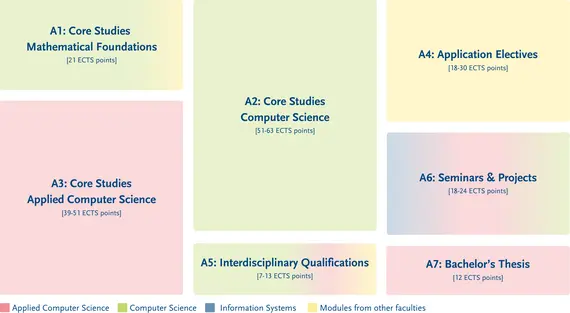Structure and Curriculum
The bachelor’s programme in Applied Computer Science is based on a standard programme duration of seven semesters and leads to the conferral the Bachelor of Science (B.Sc.) degree. It is composed of foundational studies and sections geared towards the development of an area of specialization, which are made up of elective subjects and focus areas within the field of applied computer science. This enables students to align areas of specialization in the bachelor’s programme with their own interests. Portions of the programme can also be completed at a foreign university.
The degree programme is comprised of the seven module groups outlined below.
Within this module group, students learn the mathematical fundamentals in modules like Statistics & Data Science, Mathematics for Business & Economics I and II.
This module group teaches fundamental knowledge of computer science. The compulsory area comprises programming languages, algorithms & data structures, software engineering, theoretical computer science, computer & opera-ting systems, security & privacy as well as database systems. Further modules can be selected for individual specialisation.?
Exemplary module selection options:?
- Introduction to Computer Science
- Foundations of Computer Architecture and Operating Systems
- Discrete Modeling
- Algorithms & Data Structures
- Database Systems
- Introduction to Security and Privacy
- Foundations of Software Engineering
- Logic & Computability
- Algorithms and Complexity
- Introduction to Distributed Systems?
- Java Programming
- Data Communication?
In addition to introductory modules in Applied Computer Science or Artificial Intelligence, individual specialisation options can be selected.?
Exemplary module selection options:?
- Logical knowledgerepresentation & reasoning
- Computer Graphics & Animation
- Introduction to Dialogue Systems?
- Interactive Systems
- Digital Libraries & Social Computing?
- Introduction to Media Informatics
- Introduction to Robotics
- Introduction to Algorithmic Language Comprehension
- Foundations of Information Visualization
- Mathematics for Machine Learning?
In this module group, students can choose their application electives at another faculty, e.?g. GuK or HuWi. A total of one or two subjects can be chosen, e.?g. modules in archaeology, heritage conservation, geosciences, communication sciences, psychology, sociology or economics.
In the field of interdisciplinary qualifications, two modules are initially planned which address foundations of research methods and questions of ethics for an increasingly digital society. In addition, foreign language skills can be acquired which can be fundamental for the later professional activities of the graduates due to increasing international cooperation in many fields of activity. Finally, students may choose further modules in philosophy and ethics or basic skills training courses (e.g. presentations or rhetoric).
In this module group, students can attend 2 seminars and2 to 3 projects. One seminar must be taken in the field of applied computer science. A maximum of one project can be taken in the field of computer science or business informatics.
Within the scope of the bachelor’s thesis, students employ academic methods to work independently on a specified topic. The specific topic can derive from either the computer science or applied computer science subject groups. More detailed information concerning the choice of a subject area for the bachelor’s thesis can be found in appendix 2 of the subject examination regulations (compare with the section on regulations and documents).
Continue to Admission and Enrolment
